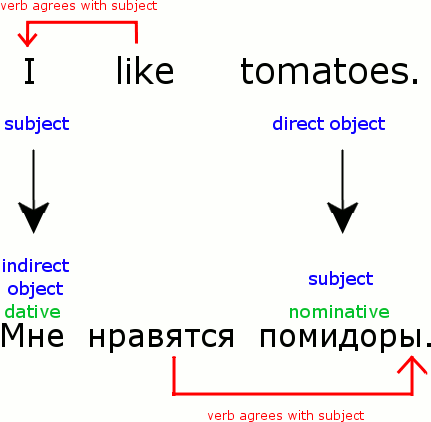Первый
The Russian word for first is первый. From the ending it's obvious that the word is an adjective. It is also a number, in a certain sense, and since it tells what order things occur in, we call it an ordinal number. Here are its endings:
| Masc | Neut | Fem | Pl | |
| Nom | первый | первое | первая | первые |
| Acc | * | первую | * | |
| Gen | первого | первой | первых | |
| Pre | первом | |||
| Dat | первому | первым | ||
| Ins | первым | первыми | ||
Russians use ordinal numbers much more than Americans do. For instance, instead of saying “Here comes bus number one,” Russians say “Here comes the first bus.” Instead of saying “I live in apartment number one,” Russians say “I live in the first apartment.” For instance:
| Идёт первый автобус. | Here comes bus number one. |
| Я живу в первой квартире. | I live in apartment number one. |
I don't mean to say that Russian always use ordinal numbers. It's also possible to say the same thing using the word номер, just less common:
| Идёт автобус номер один. | Here comes bus number one. |
| Я живу в квартире номер один. | I live in apartment number one. |
Of course, other uses of первый are also possible:
| Я получил первое письмо от Володи в январе шестьдесят третьего года. Он был в гулаге около Магадана. | I received the first letter from Vladimir in January of sixty-three. He was in a gulag near Magadan. |
| Я стал радиоастрономом, потому что хотел обнаружить первое межзвёздное сообщение от инопланетян. | I became a radio-astronomer because I wanted to detect the first interstellar communication from extraterrestrials. |
Выходить/выйти (часть третья)
Another meaning of выходить/выйти is “to turn out” in the sense of “to end up” or “to come of” or “to work out.” In this sense it is usually used in the perfective, and you encounter it particularly in the negative sense:
| Я всегда мечтал стать поэтом, но так и не вышло. | I always dreamed of being a poet, but it didn't turn out that way. |
| Я думал, что оливковое масло придаст яичнице хороший вкус, но так не вышло. Получилась жирная, скользкая, отвратительная масса. | I thought that olive oil would give a nice flavor to the fried eggs, but it didn't turn out that way. It ended up a greasy, slippery, disgusting mass. |
| Вы хотели похудеть, покупали абонементы в спортзал и нанимали персонального тренера. Но ничего из этого так и не вышло, верно? (adapted from this source) | You wanted to lose weight, bought a gym membership and hired a personal trainer. But nothing came of that, right? |
| Я хотела летом съездить в Италию, но так и не вышло. | I wanted to travel to Italy in the summer, but it didn't work out. |
You can find this meaning in the future tense as well:
| Говорят, что Селин Дион хочет устроить ряд концертов с Димой Биланом, но по-моему, у неё это не выйдет. | They say that Celine Dionne wants to set up a series of concerts with Dima Bilan, but I don't think that will work out for her. |
| Мой брат хочет верную девушку, но сам хочет гулять на стороне. Вряд ли у него так выйдет. | My brother wants a faithful girlfriend, but he himself wants to mess around on the side. That's hardly going to work out for him. |
Нравиться/понравиться (часть вторая)
Previously we discussed how the verb нравиться/понравиться works, but we didn't mention when to use the perfective form. The perfective is especially used when you are asking about someone's first impressions of something:
| — Как тебе понравилось вино? — Очень, налей ещё, пожалуйста. |
“How did you like the wine?” “A lot, pour me some more, please.” |
| — Как тебе понравились духи? — Не очень, от них у меня заболела голова. |
“How did you like the perfume?” “Not so much. It made my head hurt.” |
| — Как вам понравилась книга? — Ну, как вам сказать... обложка была красивой. |
“How did you like the book?” “Well, how can I put this... the cover was pretty.” |
| — Как вам понравился Санкт-Петербург? — Город очень интересный. |
“How did you like St. Petersburg?” “The city is really interesting.” |
The future form is also used:
| Я думаю, вам понравится этот ресторан. | I think that you'll like this restaurant. |
| По-моему, тебе понравятся эти духи. | I think that you'll like this perfume. |
Бесплатно

Who doesn't love a good deal? And the best deal is when you get something for free or "бесплатно." The adverb бесплатно means "free of charge"; the adjectival version is бесплатный. Here is how the word breaks down: the prefix без- means "without" (and here takes the form бес-) and the stem -плат- means "pay." I love it when words make simple sense like that! But remember, just because we can translate the word as "free" doesn't mean it can be used in any other context. There is a different word for "free" as in "independent" or" available." I doubt many companies want to think of 4th of July as "Free of Charge Day!"
Here are a few examples on how to use "бесплатно:"
| В салоне «Хилтон» предлагается бесплатный массаж в этот понедельник! | The Hilton spa is advertising free massages this Monday! |
| Первый приз — бесплатная поездка в Ирландию. | First prize is a free trip to Ireland. |
| В кафе мне добавили сливки бесплатно. | They added cream for me free of charge at the café. |
When I go to New York, one of my favorite places to eat is this Chinese restaurant where they have my favorite kind of deal on wine: "Вы платите за ужин, и вино бесплатно!" "You pay for dinner, and the wine is free!"
Нравиться/понравиться (часть первая)
In English we often say things like “I like tomatoes.” To express the same idea in Russian we use the verb нравиться/понравиться, but the verb does not mean ‘like’. Before we discuss its usage, let's look at its conjugation. Note that it is a reflexive verb:
| Imperfective | Perfective | |
| Infinitive | нравиться | понравиться |
| Past | нравился нравилась нравилось нравились |
понравился понравилась понравилось понравились |
| Present | нравлюсь нравишься нравится нравимся нравитесь нравятся |
No such thing as perfective present in Russian. |
| Future |
буду нравиться будешь нравиться будет нравиться будем нравиться будете нравиться будут нравиться |
понравлюсь понравишься понравится понравимся понравитесь понравятся |
| Imperative | Not generally used | |
Нравиться literally means “to please/be pleasing,” so to communicate the ‘like’ idea, you have to mentally rephrase “I like tomatoes” as “Tomatoes please me”. Notice this is grammatically quite different than the analogous English sentence. In English the person experiencing the pleasure is the subject of the sentence, and the source of the pleasure is the direct object:

In Russian the source of the pleasure is the subject of the sentence, which means it appears in the nominative case. The verb, of course, agrees with the subject. The person experiencing the pleasure is the indirect object and appears in the dative case:

Thus when one person likes another, we can have sentences like these:
| Ты нравишься мне. | I like you. Lit. You are pleasing to me. |
| Я нравлюсь тебе. | You like me. Lit. I am pleasing to you. |
There is one last quirk. In the Russian sentence, the source of pleasure often (though not always) shows up in final position, just as in the English sentence, even though grammatically it is the subject. Notice that the verb agrees with the subject in the Russian sentence, even though the subject is at the end of the sentence:

Here are some present tense sentences. Notice carefully the case of each subject and object, and how the verb agrees with the subject:
| Глебу нравятся блины. | Gleb likes crepes. |
| Анне нравится шоколад. | Anna likes chocolate. |
| Детям нравится мороженое. | Children like ice cream. |
| Нам нравится японская кухня. | We like Japanese cuisine. |
Now let's look at those same sentences in the past tense. Note how the verb agrees with the subject:
| Глебу всегда нравились блины. | Gleb always liked crepes. |
| Анне всегда нравился шоколад. | Anna always liked chocolate. |
| Детям всегда нравилось мороженое. | The children always liked ice cream. |
| Нам всегда нравилась японская кухня. | We always liked Japanese cuisine. |
<< 1 ... 49 50 51 ...52 ...53 54 55 ...56 ...57 58 59 ... 158 >>